Spider monkeys are fascinating creatures with long limbs, prehensile tails, and playful personalities. While they may seem like appealing exotic pets, owning one comes with significant responsibilities, legal considerations, and high costs. In this article, we will cover everything about keeping a spider monkey as a pet, including costs, care requirements, and whether they make good pets.
Is It Legal to Have a Spider Monkey as a Pet?
Before considering a spider monkey as a pet, it is essential to understand the legal aspects. In the United States, laws vary by state, with some states banning private ownership of primates altogether. Some places require special permits or licenses. Before purchasing a spider monkey, check local regulations to ensure compliance with the law.
Spider monkeys are highly intelligent and social, which makes them demanding pets. If you’re interested in primates, our article on the Marmoset Monkey as a Pet is a great comparison point.
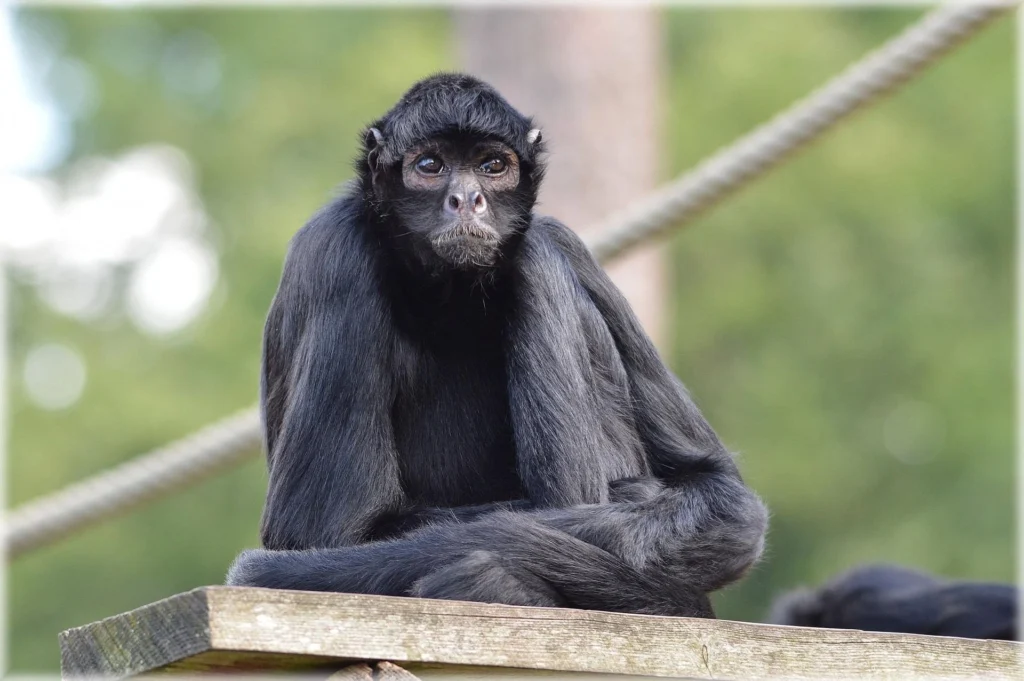
Spider Monkey Pet Cost
Owning a spider monkey is expensive. The initial cost of buying a spider monkey can range from $6,000 to $14,000, depending on the breeder and location. However, the cost does not stop at the purchase price. Other expenses include:
- Enclosure and habitat setup: $1,500 – $5,000
- Food and supplements: $50 – $100 per month
- Veterinary care: Exotic animal vets are costly, with yearly check-ups ranging from $300 – $1,000
- Enrichment and toys: $200 – $500 annually
- Permit fees and insurance: Varies by location
For more insights into primate companionship, read about Marmoset Monkeys as pets
Spider Monkeys as Pets: Prices
If you are looking to buy a spider monkey, prices vary based on factors such as age, species, and breeder reputation. The cost of a spider monkey as a pet generally falls between $6,000 and $14,000. Some rare variations or baby spider monkeys may cost even more.
Where to Find a Spider Monkey Pet?
If you are determined to own a spider monkey, you may look for pet spider monkeys for sale from exotic animal breeders, primate sanctuaries, or online listings. Some common places to check include:
- Licensed exotic pet breeders
- Wildlife rescues or sanctuaries
- Online pet marketplaces (Be cautious of scams)
- Primate-specific rescue organizations
Search for “spider monkeys for sale near me” to find local breeders or organizations. Ensure that the seller follows ethical breeding and housing practices.
How to Take Care of Spider Monkeys as Pets
Spider monkeys are highly intelligent and require constant mental stimulation to prevent boredom. This level of care is similar to what is needed for African wild dogs, which are also social and require an environment that allows for natural behaviors.
Caring for a spider monkey requires significant effort, time, and financial investment. Key care aspects include:
Diet and Nutrition
Spider monkeys require a diet rich in fruits, vegetables, and proteins. Their diet should include:
- Fresh fruits (bananas, mangoes, berries)
- Leafy greens
- Nuts and seeds
- Insects and lean proteins
- Specialized primate pellets
Housing and Enclosure
Since spider monkeys need plenty of space and social interaction, keeping one as a pet is a serious challenge. Their need for an enriched habitat mirrors that of the sugar glider, which also thrives on companionship and interactive play.
A suitable enclosure for a spider monkey should be:
- At least 8x8x10 feet in size
- Equipped with climbing structures, ropes, and branches
- Securely enclosed to prevent escape
- Climate-controlled for comfort
Socialization and Mental Stimulation
Spider monkeys are highly social and require daily interaction. Owners should:
- Spend several hours daily playing and interacting
- Provide toys, puzzles, and foraging activities
- Allow socialization with other compatible primates when possible
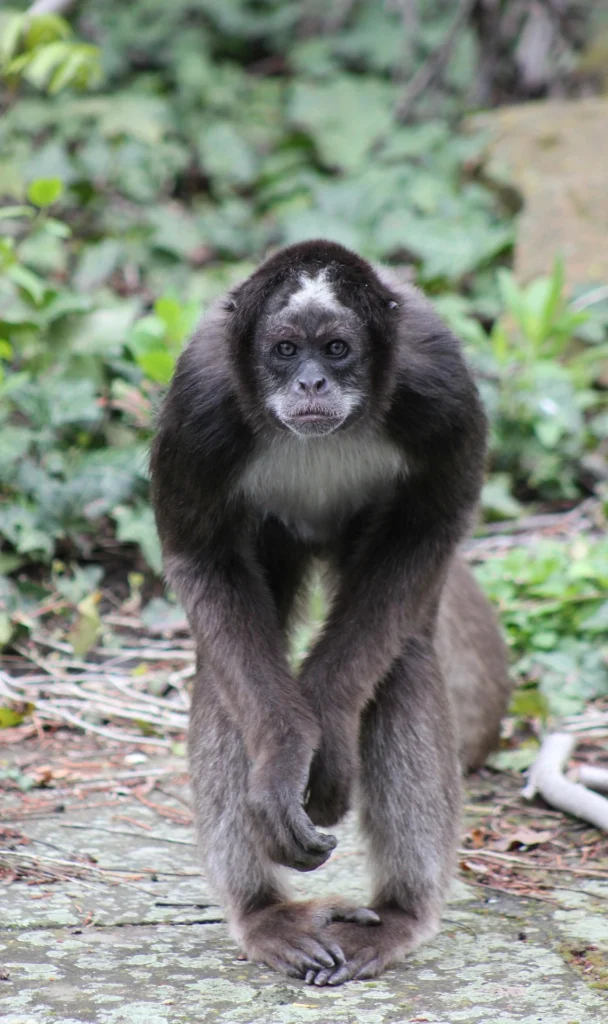
Spider Monkey Pet with Other Pets
Introducing a spider monkey to other pets can be challenging. While some monkeys can coexist with dogs or cats, it is risky due to differences in behavior. They may see smaller animals as prey or become aggressive if threatened. Always supervise interactions and provide separate living spaces.
Do Spider Monkeys Make a Good Pet?
Spider monkeys are not recommended as household pets due to their complex needs. They require constant care, socialization, and large enclosures. Without proper care, they may develop behavioral issues such as aggression, anxiety, or self-harm. they have complex needs that make them unsuitable for domestic life. Here’s why:
1. High Maintenance and Specialized Care
- Spider monkeys require large enclosures with climbing structures, as they are highly active and need space to move.
- Their diet must be carefully managed, consisting of fresh fruits, vegetables, nuts, and protein sources.
2. Legal and Ethical Issues
- Many places ban or restrict keeping primates as pets due to welfare concerns and public safety risks.
- Removing them from the wild or breeding them in captivity often involves unethical practices.
3. Behavioral Challenges
- Aggression: Even hand-raised spider monkeys can become aggressive as they mature.
- Destructive Behavior: Without proper mental stimulation, they may become frustrated and exhibit destructive tendencies.
4. Social and Emotional Needs
- Spider monkeys are extremely social animals that live in large troops in the wild. Keeping them isolated can lead to depression and stress.
5. Long Lifespan & Cost
- They can live up to 30-40 years, requiring lifelong commitment.
- The cost of a spider monkey (purchase, care, and veterinary needs) is very high.
Alternatives
Instead of keeping a spider monkey as a pet, consider supporting sanctuaries and conservation efforts to protect them in the wild.
Would you like guidance on ethical ways to interact with or support spider monkeys?
Are Spider Monkeys Friendly to Humans?
While young spider monkeys may be affectionate, as they mature, they can become unpredictable. Some may bond with their owners, but others may display territorial or aggressive behaviors, making them challenging pets.
Spider monkeys are not naturally friendly to humans in the way domesticated animals like dogs or cats are. While they are intelligent and social creatures, their behavior towards humans depends on various factors, including their upbringing, environment, and level of interaction.
1. Wild vs. Captive Behavior
- In the wild, spider monkeys are shy and wary of humans, often avoiding contact.
- Captive-bred monkeys that are hand-raised may tolerate human interaction, but they do not form the same bonds as domesticated pets.
2. Can They Be Friendly?
- Young spider monkeys may display curiosity and playfulness around humans.
- Some can develop an attachment to their caretaker if raised from infancy, but this does not mean they are fully domesticated.
3. Potential for Aggression
- As they mature, spider monkeys can become unpredictable and aggressive, especially males.
- They may bite, scratch, or display territorial behavior if they feel threatened or frustrated.
4. Need for Socialization
- Spider monkeys naturally live in large groups and require social interaction with their own species.
- Lack of proper socialization can lead to stress, anxiety, and aggressive tendencies towards humans.
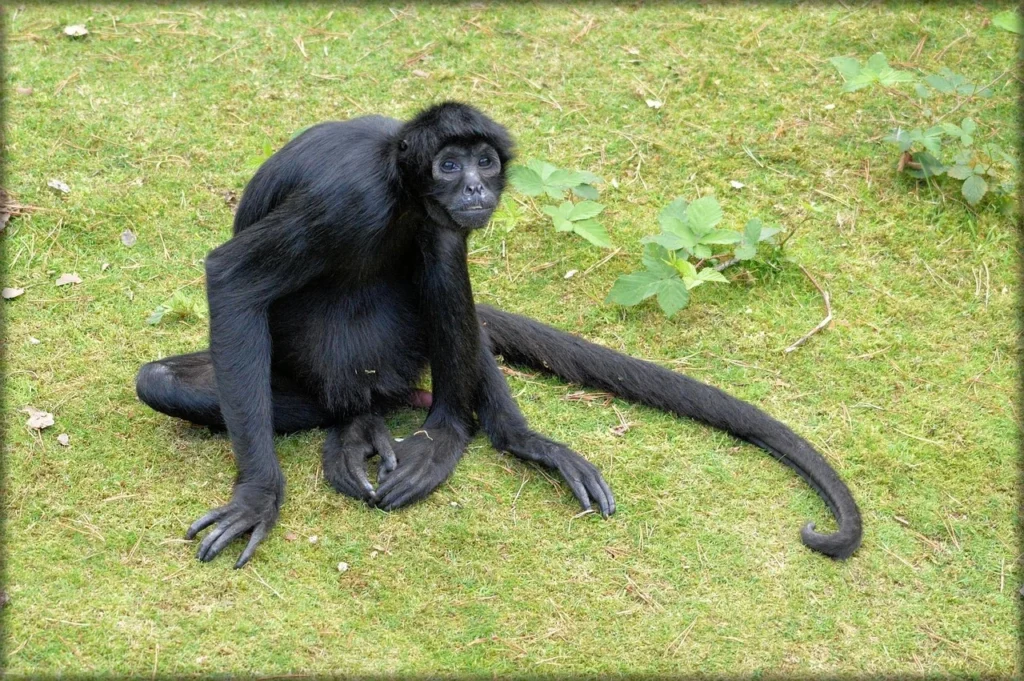
Can You Tame a Spider Monkey?
Unlike domesticated animals, spider monkeys remain wild animals even if raised in captivity. While they can be trained to some extent, they retain natural instincts that make full domestication impossible.
No, you cannot fully tame a spider monkey like a domesticated pet such as a dog or cat. Even if raised from infancy, spider monkeys retain their wild instincts and can become difficult to manage as they grow.
Why Can’t Spider Monkeys Be Tamed?
- Wild Instincts Remain
- Unlike domesticated animals, spider monkeys do not undergo generations of selective breeding for human companionship.
- They may show affection when young but can become aggressive and territorial as they mature.
- Unpredictable Behavior
- Even if hand-raised, a spider monkey’s behavior can change suddenly, especially as they reach sexual maturity.
- They may become possessive, aggressive, or destructive.
- Social and Emotional Needs
- Spider monkeys thrive in large social groups and struggle when isolated.
- Without proper socialization with other monkeys, they may develop stress-related behaviors, including aggression.
- Legal and Ethical Concerns
- In many regions, owning a primate is illegal or heavily restricted due to the risks involved.
- Many spider monkeys in captivity suffer from malnutrition, inadequate care, or behavioral problems.
Can Spider Monkeys Be Trained?
- Spider monkeys can learn commands and routines, but this is not the same as taming.
- They can be trained using positive reinforcement, but their behavior is never fully predictable.
Are Spider Monkeys Cuddly?
Many people assume that spider monkeys enjoy cuddling, but in reality, they are not typically affectionate pets. Some may tolerate handling, but many prefer their own space and socialization with other monkeys.
No, spider monkeys are not naturally cuddly like dogs or cats. While they are social animals, they typically do not enjoy being held or cuddled by humans.
Why Aren’t Spider Monkeys Cuddly?
- Wild Instincts
- Spider monkeys are not domesticated and do not seek human affection the way pets do.
- In the wild, they prefer to socialize with their troop rather than humans.
- Active and Independent Nature
- They are highly energetic and agile, constantly moving and climbing.
- Being held or restrained may make them feel trapped or stressed.
- Potential for Aggression
- Even if raised by humans, spider monkeys can become aggressive or unpredictable, especially as they mature.
- They may bite or scratch if they feel annoyed or overstimulated.
- Preferred Social Bonding
- Instead of cuddling, spider monkeys groom each other as a form of bonding.
- They prefer socializing with their own kind rather than human caretakers.
Can Some Spider Monkeys Be Affectionate?
- Young spider monkeys might cling to their caretaker like they would to their mother.
- Some individuals raised in captivity may show affection, but this is not the norm.
- As they grow older, they often become more independent and less tolerant of physical contact.
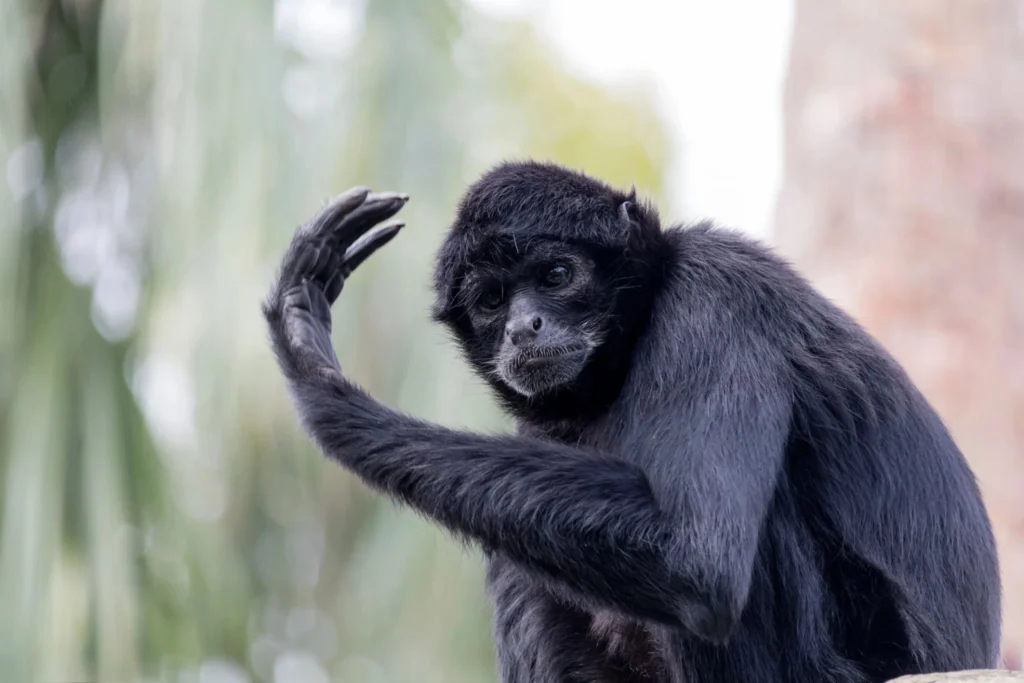
Can Spider Monkeys Get Aggressive?
Yes. Spider monkeys can exhibit aggression, especially if they feel threatened, stressed, or frustrated. They may bite, scratch, or display territorial behavior. Males, in particular, can become dominant and aggressive as they reach maturity.
Yes, spider monkeys can get aggressive, especially as they mature. While they may appear playful and friendly when young, they have natural instincts that can lead to unpredictable behavior.
Reasons Why Spider Monkeys May Become Aggressive
- Maturity & Hormonal Changes
- As spider monkeys grow, especially males, they can become more dominant and territorial.
- Their aggression can include biting, scratching, or lunging at people.
- Frustration & Stress
- If a spider monkey is kept in a small enclosure or lacks social interaction, it may become irritable.
- Monkeys in captivity often develop stress-related aggression, leading to destructive behaviors.
- Lack of Proper Socialization
- Spider monkeys are highly social animals, and if they are not raised with their species, they can develop behavioral issues.
- When deprived of their natural group interactions, they may act out aggressively towards humans.
- Territorial Behavior
- In the wild, spider monkeys live in structured groups and defend their space.
- If kept as a pet, they may see their owner as a rival and become aggressive.
- Fear or Threat Perception
- If a spider monkey feels threatened or cornered, it may lash out as a defensive response.
- Sudden movements, unfamiliar people, or perceived competition for food can trigger aggression.
How Dangerous Can Spider Monkeys Be?
- They have strong jaws and sharp teeth that can cause serious bites.
- They can carry zoonotic diseases (such as herpes B virus), which pose health risks to humans.
- Their aggression can increase with age, making them more difficult to handle over time.
Their need for mental stimulation and space can be overwhelming. If you want a pet with social needs but lower demands, consider the Chiweenie Puppies as a fun and loving companion.
Final Thoughts
While spider monkeys are intelligent and fascinating creatures, they are not ideal pets for most people. Their high costs, demanding care requirements, and legal restrictions make them challenging to own. If you are considering a pet spider monkey, ensure you have the proper resources, legal permissions, and expertise to provide them with a suitable home. Otherwise, supporting conservation efforts or visiting sanctuaries may be a better way to appreciate these amazing animals.
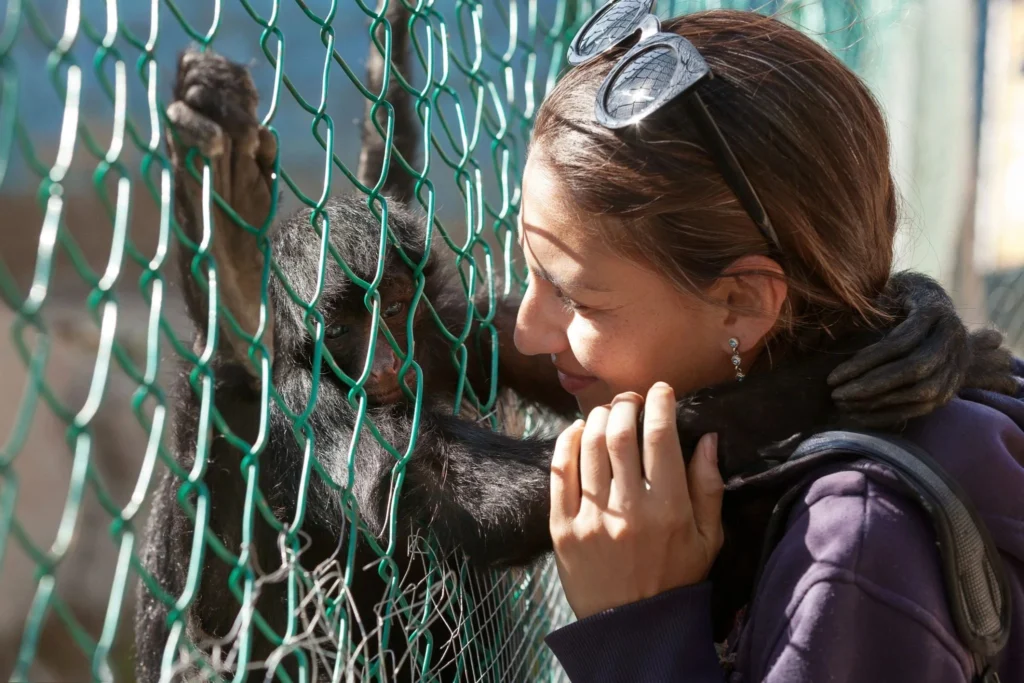
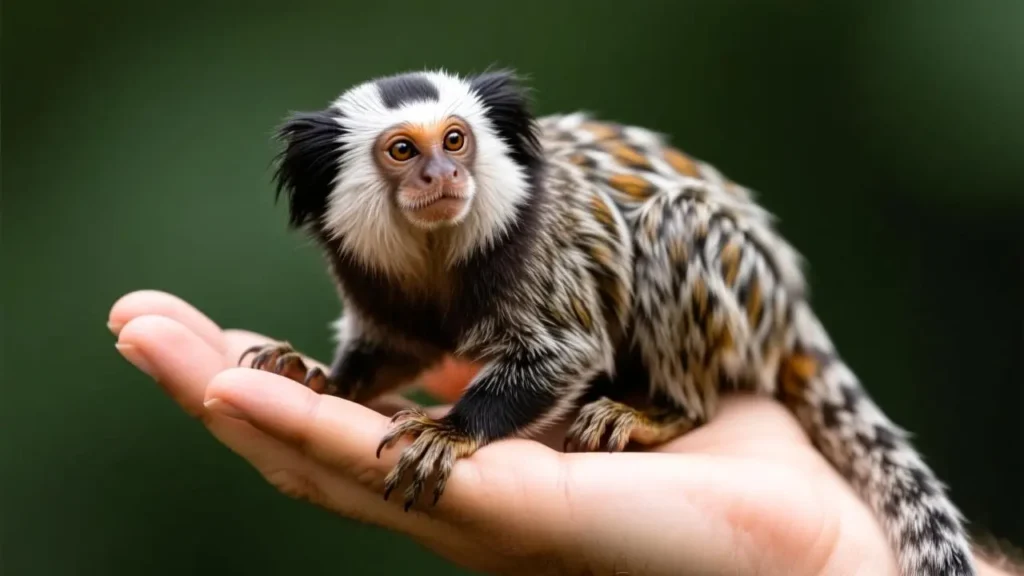

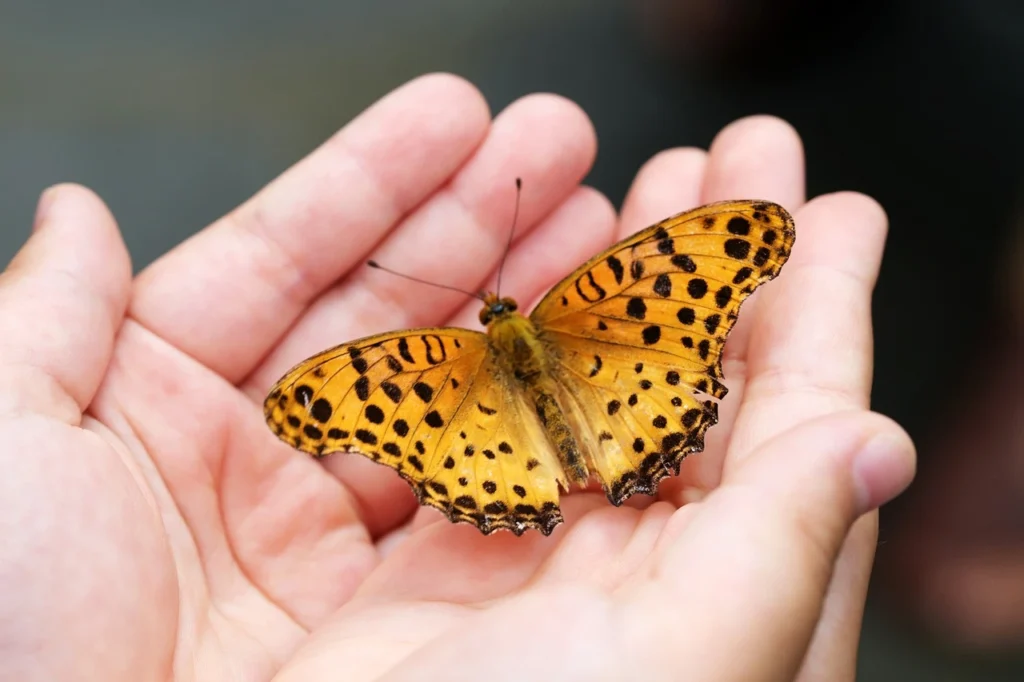


As an animal lover, you should know that wild animals are not suitable as pets, not to mention that the animals are torn from their natural habitat and many die during transportation to other countries. It would perhaps be more important to deal with the problems in your own country than to create even more problems for the environment and animals.
its a guide if someone think about having one to saave him, besides i dont think anyone can do that, its just somethink to read.
thank u 🙂